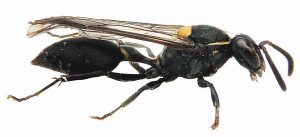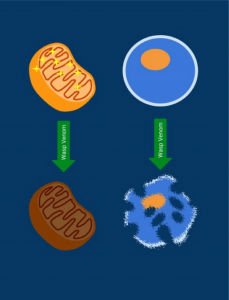Imagine hearing the words from your doctor, “You have cancer,” then feeling relived that it wasn’t anything fatal. Yes, scientists in Africa have discovered that the venom from Polybia paulista (South American Wasp) can kill cancer.

The polybia paulista (South American Wasp) is found native to Brazil, Paraguay, and Argentina.
The university of Brazil have begun experimenting its effects on mice with areas of tumour and seeing hopeful results. After stings from the wasps, the size of tumours of the mice visibly shrunk significantly. This is cause by the venom having a protein Polybia-MP1 that causes the rupture on the parts of the cell membrane with these fatty component, phosphatidylserine (PS) and phosphatidylethanolamine (PE). Cancerous cell, unlike normal cells, have these parts on the outer membrane, making them more susceptible. The venom will actively damage these parts of the cells and cause the cell to degrade.

The process in which the wasp venom kills the tumorous cells.
Reachers are excited in the discovery of such medication. There exists a saying in Chinese “以毒攻毒” meaning using poison to attack poison. The venom used does have its drawbacks. Normal cells are still susceptible to the the degradation and prolonged exposure can kill the healthy cells as well. Prolonged exposure to these venom will cause the patient to die. Researchers are still studying ways to implement this technique without harming the patient.
Dr Paul Beales, from the University of Leeds, stated that drugs that attacked the lipid structure of the cancerous cell’s membrane are a revolutionary type of drug. “This could be useful in developing new combination therapies,” as he was keen on using multiple ways to deal with the tumour at the same time to increase the efficiency and to decease the time the patient is in contact with venom.
“This early stage research increases our understanding of how the venom of the Brazilian wasp can kill cancer cells in the laboratory.” said Dr Aine McCarthy, the science information officer for Cancer Research UK. She along with many others are excited to hear and is looking forward to do more tests on this subject before it is available to treat patients.
– Steven Li
